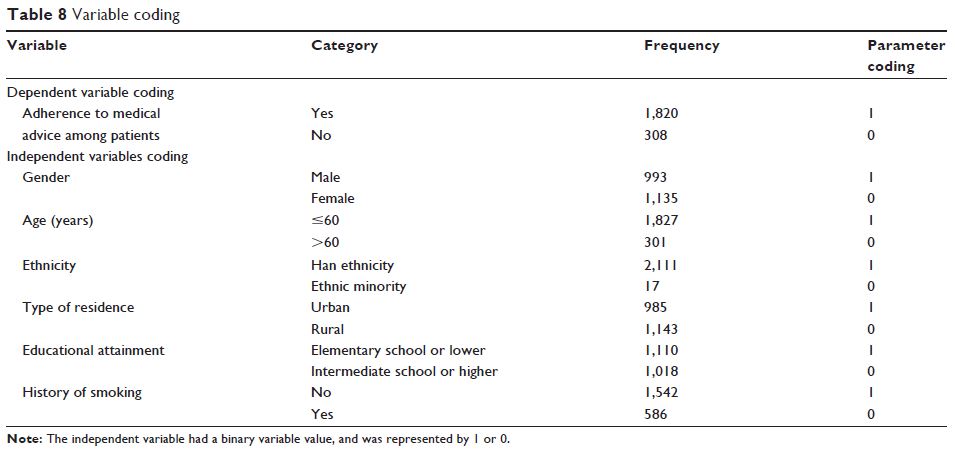108605
论文已发表
注册即可获取德孚的最新动态
IF 收录期刊
- 3.4 Breast Cancer (Dove Med Press)
- 3.2 Clin Epidemiol
- 2.6 Cancer Manag Res
- 2.9 Infect Drug Resist
- 3.7 Clin Interv Aging
- 5.1 Drug Des Dev Ther
- 3.1 Int J Chronic Obstr
- 6.6 Int J Nanomed
- 2.6 Int J Women's Health
- 2.9 Neuropsych Dis Treat
- 2.8 OncoTargets Ther
- 2.0 Patient Prefer Adher
- 2.2 Ther Clin Risk Manag
- 2.5 J Pain Res
- 3.0 Diabet Metab Synd Ob
- 3.2 Psychol Res Behav Ma
- 3.4 Nat Sci Sleep
- 1.8 Pharmgenomics Pers Med
- 2.0 Risk Manag Healthc Policy
- 4.1 J Inflamm Res
- 2.0 Int J Gen Med
- 3.4 J Hepatocell Carcinoma
- 3.0 J Asthma Allergy
- 2.2 Clin Cosmet Investig Dermatol
- 2.4 J Multidiscip Healthc

心脏瓣膜置换术后患者口服华法林依从性的分布特点及影响因素
Authors Wang XW, Xu B, Liang HL, Jiang SY, Tan HM, Wang XR, Wang X, Yu SQ, Liu JC
Received 30 April 2018
Accepted for publication 3 July 2018
Published 3 September 2018 Volume 2018:12 Pages 1641—1648
DOI https://doi.org/10.2147/PPA.S172223
Checked for plagiarism Yes
Review by Single-blind
Peer reviewers approved by Dr Justinn Cochran
Peer reviewer comments 2
Editor who approved publication: Dr Naifeng Liu
Purpose: Oral warfarin anticoagulation is a long-term treatment that is required after heart valve replacement. This treatment can prevent serious complications, such as embolism, thereby increasing patients’ postoperative survival rates and quality of life. Patients treated with artificial mechanical heart valve replacement were followed up over the phone at different times after the procedure, which is an effective method for preventing accidents related to postoperative oral warfarin anticoagulation. Our goal was to determine a method for providing theoretical guidance to patients on oral warfarin anticoagulation following heart valve replacement.
Patients and methods: The participants of this study were patients who received artificial mechanical heart valve replacements and were followed up for 2 years after the procedure. Patient adherence to medical advice was calculated, and the distribution characteristics of adherence to prescribed timing, prescribed dose, and regular clinical follow-up among patients of both sexes and of different ages, regions, and educational levels attained were compared.
Results: Univariate and multifactorial logistic regression analyses were used to evaluate the factors influencing adherence. Our analyses showed that adherence to oral warfarin anticoagulation in patients after heart valve replacement is influenced by sex, age, residential location, and educational attainment. The medication habits of patients can be evaluated accordingly via phone follow-up. As such, dose adjustment recommendations can be provided, significantly increasing the adherence to oral warfarin anticoagulation in patients after heart valve replacement.
Conclusion: Adherence to oral warfarin anticoagulation among patients after heart valve replacement is affected by sex, age, type of residence, and educational level, as well as adherence to clinical follow-up over the phone. The follow-up sessions help establish good doctor–patient communication, which is critical for timely medication guidance, thus shortening medication administration delays and decreasing the overall length of therapy.
Keywords: warfarin, artificial mechanical heart valve replacement, AMHVR, telephone follow-up, adherence, distribution characteristics
